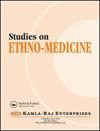Comparative Study of Informant Consensus Factor for Ethno-functional Foods among Bhil, Meena, Garasia and Damor Tribes of Southern Rajasthan, India
Q2 Social Sciences
引用次数: 2
Abstract
Informant consensus factor (ICF) is a quantitative analytical parameter to evaluate degree of agreement among informant’s knowledge and is important in sorting plants for their applicability. The present paper deals with homogeneity test of informant’s therapeutic knowledge within tribal communities and neighboring tribes of the Southern Rajasthan. Ethno-medicinal survey of various tribal localities of study area reveals 135 therapeutic usages of 79 plants for 16 body system and 64 disease category/ ailments. Different plant parts are used for various therapeutic recipes. As study area is predominantly populated by Bhil, Meena, Garasia and Damor tribes. The comparative study of their therapeutic efficacy reveals high level of homogeneity in therapeutic practices in Bhil tribe for 66.66 percent disease categories as prescribed by WHO followed by Meena, Damor and Garasia tribe. Highest ICF (1.00) was obtained for ailments of digestive system from Damor tribe indicating précised practices and agreement among practitioners.印度拉贾斯坦邦南部Bhil、Meena、Garasia和Damor部落民族功能食品的知情共识因子比较研究
知情者一致性因子(ICF)是一个定量分析参数,用于评估知情者知识之间的一致性,在植物分类中具有重要的适用性。本文研究了在拉贾斯坦邦南部部落社区和邻近部落中,举报人治疗知识的同质性检验。对研究区域各部落地区的民族医学调查显示,79种植物的135种治疗用途适用于16种身体系统和64种疾病类别/疾病。不同的植物部分用于各种治疗配方。由于研究区域主要由Bhil、Meena、Garasia和Damor部落居住。对其治疗效果的比较研究表明,在世界卫生组织规定的66.66%的疾病类别中,Bhil部落的治疗实践具有高度的同质性,其次是Meena、Damor和Garasia部落。Damor部落的消化系统疾病获得了最高的ICF(1.00),表明从业者之间的实践和一致性。
本文章由计算机程序翻译,如有差异,请以英文原文为准。
求助全文
约1分钟内获得全文
求助全文
来源期刊

Studies on Ethno-Medicine
Social Sciences-Cultural Studies
CiteScore
0.50
自引率
0.00%
发文量
13
期刊介绍:
Studies on Ethno-Medicine is a peer reviewed, internationally circulated journal. It publishes reports of original research, theoretical articles, timely reviews, brief communications, book reviews and other publications in the interdisciplinary field of ethno-medicine. The journal serves as a forum for physical, social and life scientists as well as for health professionals. The transdisciplinary areas covered by this journal include, but are not limited to, Physical Sciences, Anthropology, Sociology, Geography, Life Sciences, Environmental Sciences, Botany, Agriculture, Home Science, Zoology, Genetics, Biology, Medical Sciences, Public Health, Demography and Epidemiology. The journal publishes basic, applied and methodologically oriented research from all such areas. The journal is committed to prompt review, and priority publication is given to manuscripts with novel or timely findings, and to manuscript of unusual interest. Further, the manuscripts are categorised under three types, namely - Regular articles, Short Communications and Reviews. The researchers are invited to submit original papers in English (papers published elsewhere or under consideration elsewhere shall not be considered).
 求助内容:
求助内容: 应助结果提醒方式:
应助结果提醒方式:


